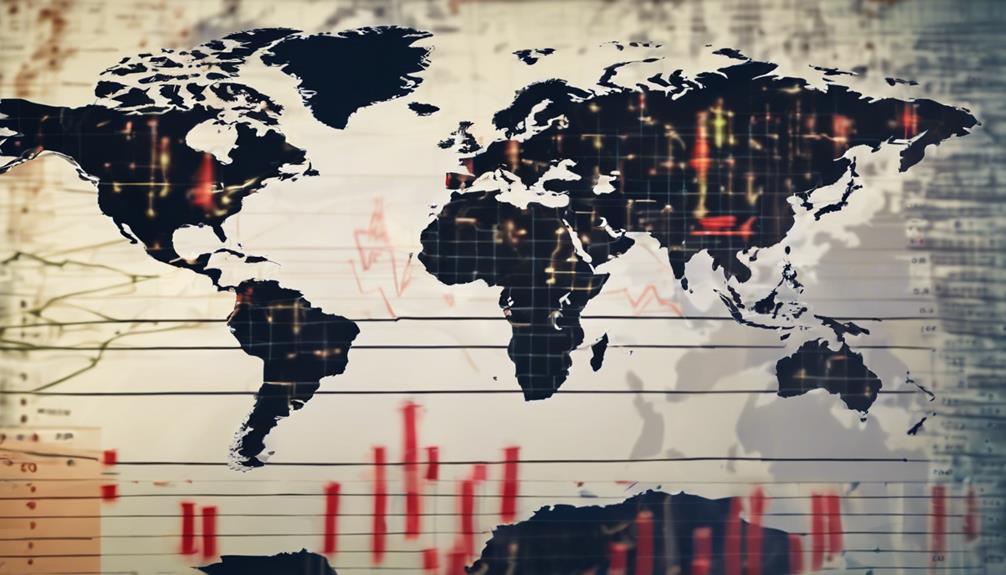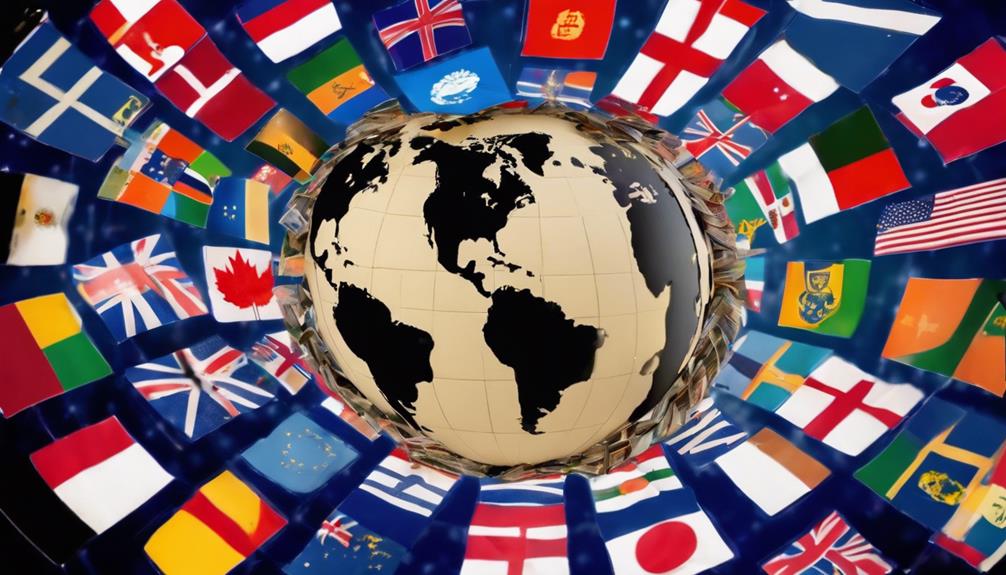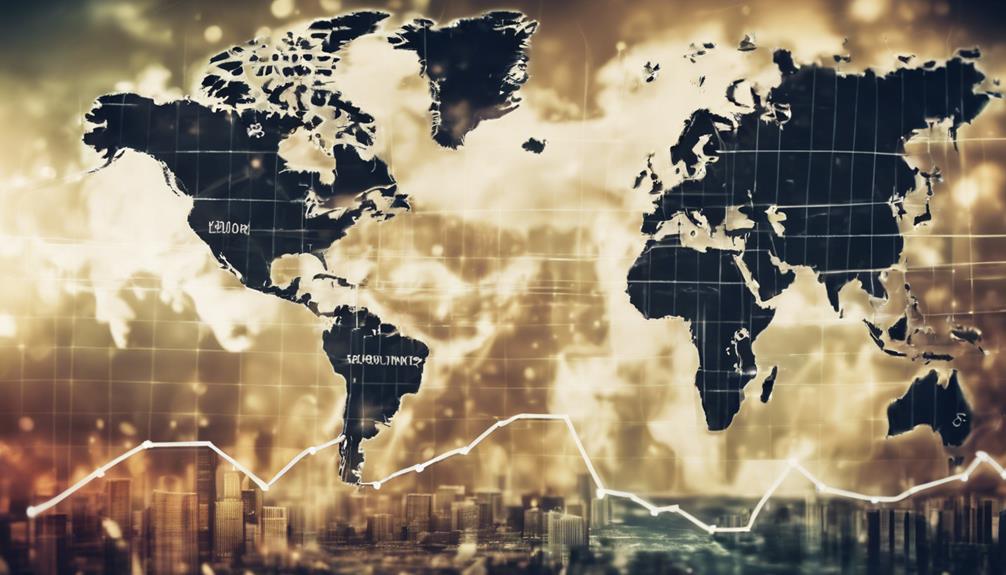As a chessboard where every move can shift the power balance, global politics play a pivotal role in the Forex market, influencing currency values with each strategic play.
You’re navigating a world where geopolitical tensions, economic announcements, and sudden policy shifts can ripple through markets, causing volatility that demands both your attention and analytical prowess.
Understanding how these elements intertwine offers a vantage point from which to anticipate market movements and make informed decisions.
Let’s explore how the delicate dance of international relations and economic policies shapes the intricate world of Forex trading, preparing you to anticipate the next major move on the global stage.
Key Takeaways
- Political stability and unrest significantly influence currency value and investor confidence.
- Elections can introduce market volatility, affecting forex trading strategies and currency fluctuations.
- Geopolitical conflicts and international agreements lead to heightened forex market volatility and currency rate changes.
- Central bank decisions and economic policies directly impact currency strength and forex market dynamics.
Global Events and Forex

Global Events and Forex
We explore the intersection of global politics and forex trading. Global events, from geopolitical tensions to natural disasters, significantly influence the forex market, shaping currency values in complex ways. You’re navigating a world where the intricacies of central bank policies, economic data releases, and even natural disasters converge to dictate the ebb and flow of currency movements. It’s essential to grasp how these factors, interlinked with geopolitical tensions like the trade war, sow seeds of market uncertainty, compelling traders to stay abreast of every development.
Central bank decisions on interest rates and monetary policies are pivotal, directly affecting currency value. An increase in interest rates, for instance, typically bolsters the currency’s value, attracting investors seeking higher returns. Conversely, economic data releases, including GDP reports and employment statistics, offer critical insights into a country’s economic health, influencing forex market dynamics.
Trade agreements, whether forged or dissolved, introduce another layer of complexity. The making or breaking of these agreements can lead to sudden fluctuations in currency values, reflecting the market’s sensitivity to any shift in international trade relations. Natural disasters, too, have a tangible impact, as they can drastically alter market sentiment, underscoring the forex market’s vulnerability to global events beyond economic indicators and policies.
Global Politics and Forex: Political Influence on Currencies
Political dynamics, from elections to policy shifts, play a crucial role in shaping the fortunes of national currencies, impacting investor confidence and market stability. Understandably, the influence of politics on currency value can’t be overstated. Government policies, particularly those related to fiscal management, directly affect economic growth, thereby influencing the strength or weakness of a nation’s currency.
Consider these factors:
- Political stability inspires investor confidence, leading to a stronger currency as it signals a predictable and conducive environment for economic activities.
- Political unrest introduces uncertainty, causing investors to shy away from a nation’s financial assets, which in turn depreciates the currency value.
- Government interventions in the economy, through fiscal policies or direct market actions, can either spur growth or lead to economic downturns, significantly impacting currency exchange rates.
As you navigate the complex web of global finance, it’s crucial to recognize that political events and government actions are powerful drivers behind currency fluctuations. Whether it’s the anticipation of political unrest, shifts in fiscal policies, or changes in diplomatic relations, each has a profound effect on investor confidence and, ultimately, on currency values.
Elections and Market Volatility

Elections and Market Volatility
Understanding the significant role that political dynamics play in influencing currency values, it’s crucial to examine how elections, as pivotal political events, introduce market volatility and impact forex trading. Elections in major economies, notably the US, become focal points for forex traders due to their potential to alter investor sentiment and trigger speculative trading. The uncertainty surrounding election outcomes can lead to increased market volatility as traders try to anticipate the effects of possible changes in government leadership on economic policies.
Forex traders closely monitor these developments, making strategic adjustments to their risk management strategies to navigate the fluctuating currency pairs. These market reactions to election results can be immediate and significant, impacting global market sentiment and providing both challenges and opportunities for traders.
| Factor | Impact on Forex Trading |
|---|---|
| Election Outcome | Immediate volatility spikes |
| Speculative Trading | Increased market fluctuations |
| Shifts in Economic Policy | Long-term currency value changes |
Understanding these dynamics helps you appreciate the nuanced ways in which elections influence market volatility. As a forex trader, staying informed about election developments and adjusting your strategies accordingly is key to managing risks and capitalizing on the opportunities presented by these periods of heightened volatility.
Geopolitical Conflicts’ Effects
Amid escalating trade disputes and regional tensions, particularly in the Middle East, the forex market often experiences heightened volatility, affecting currency exchange rates and trading strategies. Geopolitical conflicts, from trade wars to regional unrest, can significantly disrupt global economic stability. This instability, in turn, influences currency pair dynamics, leading to increased volatility that traders must navigate.
To understand how geopolitical risks impact the forex market, consider the following:
- Global economic stability is inherently tied to geopolitical events. As tensions rise, uncertainty increases, leading to fluctuations in currency exchange rates.
- Middle East tensions have a pronounced effect on forex markets due to the region’s significant impact on global oil prices, directly influencing currency values of oil-exporting and importing countries.
- Traders’ strategies must evolve to manage risks effectively during periods of geopolitical uncertainty. Adapting to changing market conditions by incorporating risk management techniques is essential for protecting investments.
In this environment, it’s crucial for you to stay informed about global events and understand their potential effects on the forex market. By analyzing geopolitical conflicts and adjusting your trading strategies accordingly, you can better manage risks and capitalize on the opportunities presented by increased volatility.
International Agreements’ Impact

International Agreements’ Impact
While geopolitical conflicts undoubtedly shape the forex market’s immediate landscape, it’s crucial to also explore how international trade agreements, from NAFTA to the EU, directly influence currency exchange rates. These agreements, whether being signed or terminated, can lead to significant fluctuations in currency values. For instance, the Trans-Pacific Partnership (TPP) has the potential to boost economic growth and strengthen the currencies of the involved countries by enhancing trade dynamics and economic interdependence.
Moreover, the Brexit negotiations between the UK and the EU have induced volatility in the British pound’s value, showcasing how political decisions within international agreements can sway currency movements. The US-China trade war further exemplifies this dynamic, with its global economic implications affecting not just the currencies of the two nations involved but also impacting global currency exchange rates.
These scenarios underscore the profound impact international agreements have on the forex market. As a trader, understanding the intricate relationship between international agreements and currency values is paramount. It’s about recognizing that these agreements aren’t just political or economic formalities; they’re powerful drivers of global economic activity and currency movements, influencing your trading strategies and decisions.
Trading Strategies Amid Politics
Navigating the volatile landscape of forex markets requires traders to adeptly adjust their strategies in response to political events, leveraging insights into potential policy shifts and market sentiment changes. As a trader, you’re constantly on the lookout for indicators that signal how geopolitical tensions, government announcements, and alterations in trade relationships might sway currency values and, consequently, your trading outcomes.
To thrive in this dynamic environment, consider these strategies:
- Stay abreast of government announcements: These can offer a precursor to policy changes that significantly impact market sentiment and currency valuations.
- Analyze geopolitical tensions: Understanding the nuances of international conflicts and alliances helps predict shifts in currency pairs, enabling you to position your portfolio advantageously.
- Evaluate trade relationships: Shifts in trade agreements or disputes between countries can herald changes in currency demand, providing trading opportunities.
Each of these strategies requires a keen understanding of the interplay between political events and forex markets. By incorporating risk management practices that account for sudden policy changes and market sentiment shifts, you can navigate trading strategies amid politics with greater confidence, aiming for more predictable trading outcomes despite the inherent uncertainties of global politics.
Monitoring Policy Shifts

Monitoring Policy Shifts
To effectively monitor policy shifts, it’s imperative to observe changes in central bank interest rates, as these can significantly influence currency values and exchange rates in the forex market. Central bank interventions, often manifested through adjustments in interest rates, serve as pivotal indicators for traders aiming to navigate the complexities of the forex market. These interventions aren’t arbitrary; they’re responses to economic indicators that reflect the health of an economy, such as inflation rates, employment figures, and GDP growth.
Understanding the reasons behind policy changes requires a deep dive into economic indicators and an acute awareness of government announcements and fiscal policies. This knowledge equips you with the foresight to anticipate shifts in currency values and exchange rates, enabling informed decisions that can safeguard and potentially enhance your investments.
Monitoring policy shifts isn’t a passive activity. It demands engagement with a myriad of data sources, analysis of fiscal policies, and interpretation of government announcements. In doing so, you become adept at discerning the nuanced ways in which policy changes can ripple through the forex market, impacting currency values and exchange rates. Mastery in this area isn’t just about reacting to changes; it’s about anticipating them, ensuring your strategy remains robust in the face of global economic dynamism.
Geopolitical Alliances and Forex
Understanding the complex web of geopolitical alliances is essential for forex traders, as these relationships directly influence currency stability and market dynamics. The intricate interplay between countries through trade agreements, diplomatic relations, and defense pacts shapes the global economic landscape, affecting the forex markets profoundly. As you delve deeper into forex trading, recognize that geopolitical alliances are a pivotal factor that can either mitigate or amplify market volatility.
To hook your analytical mind, consider these key points:
- Geopolitical alliances bolster or weaken investor confidence, directly affecting currency values.
- Trade pacts among countries can lead to a more predictable forex market, reducing currency fluctuations.
- Conversely, tensions within alliances may introduce market uncertainty, challenging even the most seasoned traders.
In this scholarly exploration, it’s clear that understanding the dynamics of geopolitical alliances offers a strategic advantage in navigating the forex markets. These alliances, through trade agreements and diplomatic relations, lay the groundwork for either market stability or uncertainty. For anyone aspiring to master forex trading, grasping the influence of geopolitical alliances, trade pacts, and defense agreements is indispensable. This knowledge equips traders to assess potential risks and opportunities with greater precision, turning market challenges into profitable ventures.
Crisis Management and Currencies

Crisis Management and Currencies
In times of political crisis, one often witnesses dramatic shifts in the value of affected nations’ currencies, underscoring the critical role of adept crisis management in mitigating such financial turbulence. These fluctuations in currencies stem from a blend of investor anxiety and speculation, both keenly responsive to the nuances of political uncertainty. Effective crisis management, therefore, becomes pivotal, not merely as a tool for political stabilization but as a means to shore up investor confidence and stabilize currency values.
The forex market, inherently sensitive to political developments, reacts swiftly to signs of political crises. This volatility, while it can spell opportunity for some, poses a significant risk to the economic stability of the nations involved. Governments and central banks, aware of the critical eye of the market, often employ strategic communication alongside policy measures aimed at reassuring investors and the public alike.
As market participants closely monitor crisis developments, their collective actions, based on perceptions of the effectiveness of crisis management, directly influence exchange rates. Thus, the capacity of a nation to manage crises effectively can have far-reaching consequences on its currency’s stability, making crisis management not just a political necessity but an economic imperative.
Frequently Asked Questions
How Does Forex Trading Benefit the Economy?
You might wonder how forex trading benefits the economy. It’s quite straightforward: by promoting international trade and investment, it fosters economic growth. Forex trading enhances market efficiency, allowing businesses to manage currency risks effectively.
It also injects liquidity into the market, ensuring smooth transactions. Through speculation, it attracts capital, stimulating economic expansion. Moreover, efficient forex markets play a crucial role in maintaining price stability, which is vital for economic development.
What Is the Impact of Forex Trade?
Forex trade impacts the economy by influencing currency values, affecting international trade balances, and providing liquidity to global financial markets.
You’ll find it’s a vital tool for hedging against currency risk and diversifying portfolios.
As you delve deeper, you’ll notice that it reflects the economic health of nations, driving investment flows and influencing interest rates.
Understanding these dynamics is crucial for making informed decisions and capitalizing on market movements.
How Do Exchange Rates Impact International Business?
You’ve likely noticed how a 10% fluctuation in exchange rates can shift your international business’s profit margins significantly. Exchange rates directly determine your costs when importing or exporting goods, affecting competitiveness in global markets.
A stronger local currency can dampen your international sales by making exports pricier for foreign buyers. Conversely, a weaker currency raises your import costs, squeezing production budgets.
Savvy businesses often employ hedging strategies to navigate these challenges effectively.
How Does Political Stability Affect Exchange Rates?
You’ll find that political stability significantly influences exchange rates. When a country enjoys stable governance, it often sees its currency strengthen due to heightened investor confidence.
This stability encourages economic growth, attracting foreign investment and bolstering the currency’s value. Conversely, political turmoil can scare investors away, leading to a weaker currency as they look for safer havens.
Thus, the steadiness of a nation’s political landscape is key to its currency’s performance in the forex market.
Conclusion
You might argue that the sheer unpredictability of global politics makes forex trading akin to gambling. However, a discerning analysis reveals patterns and trends within this apparent chaos.
By understanding how elections, geopolitical conflicts, and international agreements sway currency values, you can navigate the forex market with informed strategies, not just luck.
This insight doesn’t eliminate risk but refines your approach, turning global political awareness into a potent tool for informed forex trading decisions.
